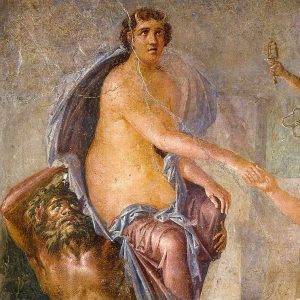Io in Greek Mythology
Io belongs to the royal house of Argos or Corinth which are considered her places of origin. In the myths that connect her with Argos, mainly the tragic ones, she is the daughter of the river god Inachus, son of Oceanus, and Melia or Iasos and Lefkanis.

She was a priestess of Hera in the Heraion of Argos and became the mistress of Zeus, either because the girl’s beauty caught the eye of the supreme god or thanks to, or because of, the magic of Hygga, daughter of Echo.
The union of the god with the mortal took place after the intervention of the oracles of Delphi and Dodona, where the father of Ios fled, to explain to him a dream that his daughter saw that motivated her to go to the shores of the lake of Lerna and unites with Jupiter.
The divination helped that the girl had to follow the instructions of the dream, otherwise the royal house would be in danger from the thunderbolt of Jupiter. The love affair was immediately noticed by Hera, who, unable to do anything to her all-powerful husband, this time also pursued his mistress. To protect her from Hera’s jealousy, Zeus transformed Io into a white cow, so special that Hera asked for this heifer as worthy to be offered to her.
Now dedicated to Hera, Io was guarded by Argos, from the same royal house as Io. During the day he left her free to graze, at night he tied her to an olive tree, which had grown in a sacred forest in Mycenae, and watched over her constantly thanks to the fact that when she slept, only half of his eyes were closed; the others, wide open, supervised .
In search of her food, the heifer Io wandered first to Mycenae, then to Evia, always with Argos as her overseer. Flowers grew everywhere he passed. Zeus, who sometimes assumed the form of a bull to unite with his beloved, took pity on her and asked Hermes to save the girl from her guardian.
Hermes either slew Argos with a stone thrown from afar, or, playing the lute of Pan, or with his magic wand, lulled the fifty watchful eyes to sleep, while the other fifty slept their natural sleep. In this state, he killed him with his scythe.
Hera granted immortality to her favored eyes by placing them in the wings of the peacock, a bird dedicated to her.
A variation of the myth attributes to Hera herself the transformation of Ios and that the cow’s body had three colors – white, violet and black – or that her skin changed colors successively.
The death of Argus did not free Io from the torment of wandering. Hera sent her an oestrus fly that stuck to her ribs and tormented her. Mad with rage, Io began running back and forth in a desperate attempt to get rid of the fly.
She ran along the shores named by her the Ionian Sea, crossed the straits between Europe and Asia, which were also named by her, after the passage of the cow (boos poros), Bosphorus.
He wandered in Illyria, Scythia, reached the Cimmerian land (Crimea) and the Caucasus where Prometheus was bound, in Asia – from which they say the city of Ioni, today’s Gaza, was named – until he ended up in Egypt, where, in a safe and friendly environment for her, and assuming her form again, she gave birth to her son by Zeus, Epaphus, from whom the great royal houses of Egypt and Argos begin.
It was also said that Io was bought from the pirates by the king of Egypt and sent her father Inachus a bull as compensation. But Inachus was already dead and the ambassadors who accompanied the bull and did not know what to do with it began to show it to the locals, taking money from them, as they had never seen a bull before.
The philosopher and grammarian Palaifatos (3rd century BC) considers the story of Ios’s transformation into a cow improbable, as well as her survival after several days of starvation on her journey from Argos to Egypt.
So he thinks that Io, daughter of the king of the Argives and priestess of Hera, feared her father and the citizens of her country because of an unwanted pregnancy and left secretly. The Argives looked for her and said the phrase: “she escapes like a cow in heat”.
From this also arose the misunderstanding of history. In the meantime, Io, so that they would not find her and lead her back home bound, asked foreign merchants, begged them, to take her with them to Egypt.
